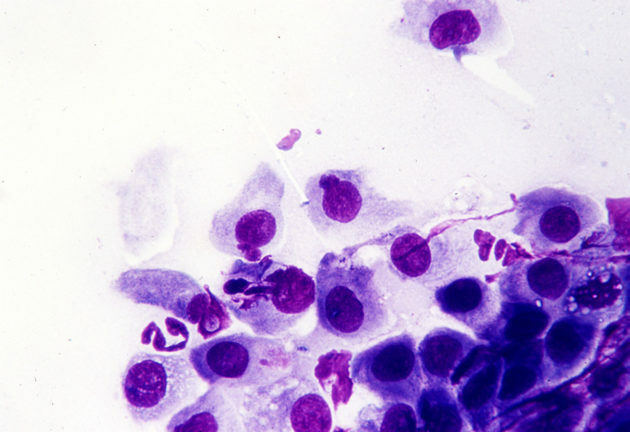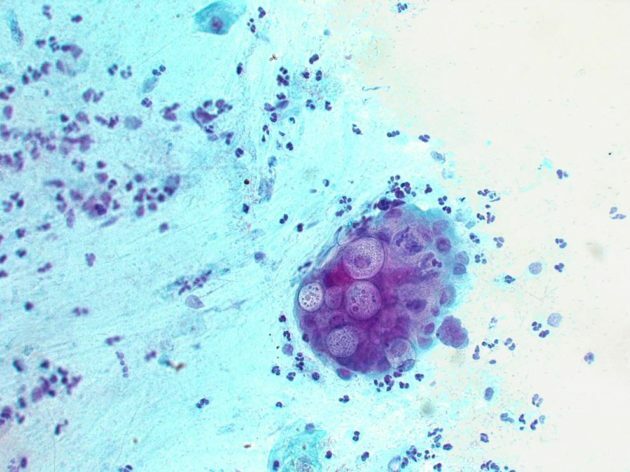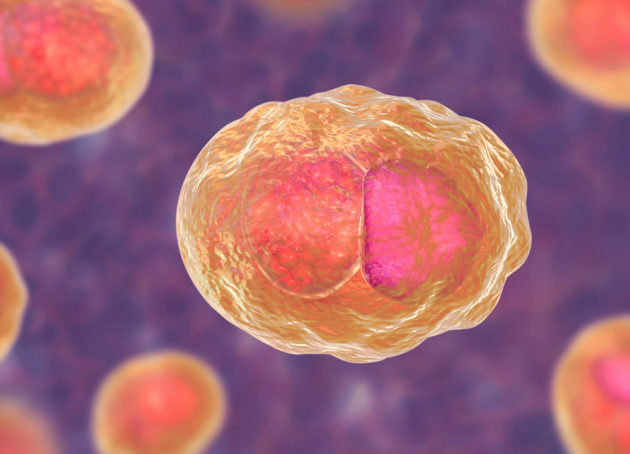Content
- 1 Is chlamydia infection dangerous for a pregnant woman?
- 2 The causes of chlamydia in pregnant women
- 3 Symptoms of chlamydia in women during pregnancy
- 4 Diagnosis of chlamydia in pregnant women
-
5 How chlamydia affects pregnancy and the fetus
- 5.1 Consequences of chlamydia during pregnancy for a child
- 5.2 The effect of chlamydia on women during pregnancy
- 6 Features of childbirth with chlamydia
- 7 Chlamydia treatment during pregnancy
- 8 Is it possible to get pregnant after chlamydia in women
- 9 When can you get pregnant after chlamydia treatment?
- 10 Conclusion
- 11 Reviews of chlamydia during pregnancy
Chlamydia during pregnancy in women is a danger to both the expectant mother and the fetus. If the disease is detected already during the gestation period, it is urgent to start treating it.
Is chlamydia infection dangerous for a pregnant woman?
Chlamydia is an infectious disease of the genitourinary system that can provoke serious complications. With an advanced ailment, women often develop lesions of the uterus and fallopian tubes, and there is a threat to the fetus during pregnancy.
The peculiarity of chlamydia is that for a long time it may practically not manifest itself as symptoms. Many women find out about the infection after pregnancy. The disease during gestation is dangerous because:
- impairs the attachment of the embryo to the walls of the uterus;
- increases the likelihood of miscarriage;
- increases the risk of premature birth;
- increases toxicosis in a pregnant woman;
- provokes postpartum endometritis.
If the presence of an infection becomes known even at the planning stage of the child, it is recommended that you first recover, and only after that work on conception.

Chlamydia can be transmitted to the fetus in the womb and lead to developmental disabilities
The causes of chlamydia in pregnant women
Chlamydia in the blood during pregnancy appears in women for the same reasons as outside of gestation. There are three ways of transmission of infection:
- Sexual. Infection occurs through unprotected sexual intercourse, while the infected man himself may not be aware of the presence of chlamydia.
- Domestic. In some cases, the pathogen enters the female body through bedding, someone else's towel or washcloth.
- Vertical. The infection can be chronic, received from the mother during childbirth.
Most often, the cause of chlamydia in women during pregnancy is precisely sexual contact with a sick partner, which occurred before conception or in the early stages of gestation.
Symptoms of chlamydia in women during pregnancy
Chlamydia during pregnancy is accompanied by standard symptoms. But at the same time, the signs of the disease, as in ordinary situations, are rather blurred and do not allow us to confidently recognize the infection.
You can suspect chlamydia if you have the following symptoms:
- itching and burning of the external genital organs;
- unusual yellowish or greenish discharge with an unpleasant odor;
- dull pulling pains in the lower abdomen;
- slight increase in body temperature;
- frequent and painful urge to urinate.
If a pregnant woman is sexually active, she may also experience discomfort during sex. If warning signs appear, you should immediately consult a doctor and get tested for both chlamydia and other infections.
Diagnosis of chlamydia in pregnant women
Only laboratory tests can accurately determine the presence of chlamydia in a pregnant woman's body. If an infection is suspected, carry out:
- analysis of urine and blood;
- examination of a vaginal smear for flora;
- PCR analysis of biological material;
- ELISA blood test aimed at finding antibodies to chlamydia.
The doctor also performs a standard gynecological examination of the patient in the chair. It is impossible to detect chlamydia without laboratory analysis. But indirectly, the presence of infection is indicated, including redness and swelling of the external genital organs.

Chlamydia is often accompanied by secondary infections that make diagnosis difficult
If you suspect chlamydia in a pregnant woman, the gynecologist may prescribe a study of the amniotic fluid. The material is taken through a sterile and completely safe puncture. The procedure is carried out under ultrasound control and allows you to establish whether the fetus has become infected. The study usually does not require anesthesia, since the unpleasant sensations are no more than a standard blood sampling.
How chlamydia affects pregnancy and the fetus
The consequences of chlamydia during pregnancy for the child and the woman herself can be quite dangerous. The infection can cause:
- interruption of gestation in the early stages;
- stopping the development of the fetus in the womb;
- premature birth in the third trimester;
- fetal hypoxia, which can lead to serious congenital abnormalities.
It is necessary to start treating chlamydia with symptoms in pregnant women as soon as possible. A neglected disease is especially dangerous at the stage of childbirth.
Consequences of chlamydia during pregnancy for a child
Chlamydia during pregnancy threatens, first of all, the life of the baby in the womb, since the infection often provokes a miscarriage. But even if the gestation is successfully completed, the danger to the newborn remains. In particular, the disease leads to:
- to a lack of body weight in a baby;
- to congenital pathologies of the liver, pancreas and intestines;
- to cystitis and urethritis in childhood;
- to neurological disorders;
- to acute and chronic lesions of the mucous membranes - rhinitis and conjunctivitis;
- to bronchitis and pneumonia immediately after birth.
Attention! Potent antibiotics given to children to treat chlamydia can help clear up the infection, but can negatively affect overall health.
The effect of chlamydia on women during pregnancy
A neglected infection is dangerous not only for the fetus, but also for the expectant mother. If you do not treat chlamydia during pregnancy or try to cope with self-selected drugs, the disease will lead to:
- to the development of endometritis, salpingitis and salpingo-oophoritis;
- to chronic inflammatory processes of the fallopian tubes and appendages;
- to Reiter's disease - with this ailment, the mucous membranes of the eyes and urethra, as well as the joints, are simultaneously affected.
Chlamydia, if untreated, negatively affects the overall health of the reproductive system. Even if a pregnant woman manages to safely give birth to a child, she may subsequently face infertility.

In advanced cases, chlamydia leads to the need to remove the fallopian tubes
Features of childbirth with chlamydia
Launched chlamydia in a pregnant woman can cause significant complications directly during childbirth. Most often, the infection provokes:
- premature discharge of water;
- difficulties with natural childbirth - a woman may need a cesarean section;
- polyhydramnios and clouding of amniotic fluid.
Carrying on the background of chlamydia often leads to the fact that immediately after giving birth, the baby is placed in the intensive care unit. Many babies require immediate help and special monitoring due to hypoxia, which began to develop in the womb.
Attention! If a woman in labor suffers from chlamydia, a special mark is put in her medical record, warning the hospital staff about possible complications.
Chlamydia treatment during pregnancy
The treatment regimen for chlamydia in pregnant women with drugs should be selected exclusively by a doctor. Therapy of the disease is complicated by the fact that not all drugs are approved for use when carrying a child. When highly effective, some tablets have a toxic effect on the fetus.
In addition, chlamydia is often accompanied by thrush, gonorrhea, and other secondary infections. Treatment in such cases is carried out in a complex, using drugs from different groups. It is simply impossible to choose the right drugs and determine safe dosages without special knowledge.
Most often, the following remedies are used to eliminate chlamydia:
- antibiotic from the macrolide group Azithromycin;
- penicillin drug Amoxicillin;
- antibiotics Josamycin and Erythromycin;
- drugs Dedoxil and Gonoform.
The dosage and duration of medication is determined by the doctor, based on the results of diagnostics and the characteristics of the woman's body. In the treatment of chlamydia in the third trimester of pregnancy or earlier, macrolide drugs are most popular. When using them, a single use of the active substance is sufficient.

Azithromycin and other antibiotics are prescribed for chlamydia not earlier than 12 weeks of pregnancy
Chlamydia during pregnancy can be treated with topical medications. But the doctor should also prescribe them and only in combination with antibiotic agents. Suppositories and gels are used mainly as an adjunct to the main therapy - to relieve itching and burning, as well as to eliminate discharge.
Self-medication with folk remedies for chlamydia should be avoided. Herbal medicine rarely gives a quick and long-term effect. In addition, potent herbs that are dangerous for pregnant women and increase the likelihood of miscarriage are usually used to eliminate the infection.

You can use herbal infusions for chlamydia during gestation for washing and lotions
Is it possible to get pregnant after chlamydia in women
Chlamydia often affects the entire reproductive system. A neglected infection provokes chronic inflammatory processes in the pelvic organs, leads to the appearance of adhesions and obstruction of the fallopian tubes, and increases the risk of neoplasms.
Postponed chlamydia does not always lead to infertility. However, this complication is quite common. Problems with conception are experienced both by girls planning a child for the first time and by patients who have already given birth.
A warning! After chlamydia, a woman can easily become pregnant, but then face numerous complications during gestation.
When can you get pregnant after chlamydia treatment?
If chlamydia is found during pregnancy, then the woman has to treat it during gestation. But if the diagnosis was made at the planning stage, you must first get rid of the infection, and only then return to attempts at conception.
Direct therapy of the disease usually takes no more than 2-3 weeks. But getting rid of chlamydia is not always complete. Sometimes it only goes into a latent form and will soon relapse. Therapy can be hampered by secondary fungal and bacterial processes that have arisen against the background of infection.
Usually, women are advised to plan a pregnancy after treatment for chlamydia no earlier than two months after starting the drug. Ideally, at the end of therapy, it is necessary to obtain negative test results for the pathogen, wait another 1-2 months and undergo re-diagnosis. If chlamydia is not found in the body again, it will be possible to focus on trying to get pregnant.

With chlamydia in a pregnant woman, her sexual partner must also undergo treatment.
Conclusion
Chlamydia during pregnancy in women greatly complicates gestation. It is better to take an analysis for the causative agent of the infection even at the planning stage of the child. But if the disease was detected too late, it is necessary to begin urgent treatment under the supervision of a doctor in order to reduce possible risks to the fetus and one's own health.
Reviews of chlamydia during pregnancy
Stepanova Tamara Sergeevna, 33 years old, g. Bryansk
When I was diagnosed with chlamydia at the beginning of pregnancy, at first I was scared - the complications of the infection are dangerous. But the symptoms were mild, the gestation was calm. In the second trimester, the doctor prescribed antibiotics for direct treatment and at the same time prescribed suppositories for the thrush that had joined. We managed to cope with the diseases, gave birth already without infections, and most importantly, it turned out to avoid the infection of the child.
Avdeeva Tatyana Vladimirovna, 27 years old, g. Moscow
I read a lot about the danger of chlamydia on women's forums. I did not expect to face an infection, but at the beginning of pregnancy it turned out that my usual thrush proceeds precisely against the background of this disease. From the second trimester I took an antibiotic with Azithromycin, the remedy helped against chlamydia. But the associated inflammatory processes turned into a chronic form, and I have been treating them for a year now.
The information and materials on this site are provided for informational purposes only. You should not rely on information as a substitute for actual professional medical advice, assistance, or treatment.
